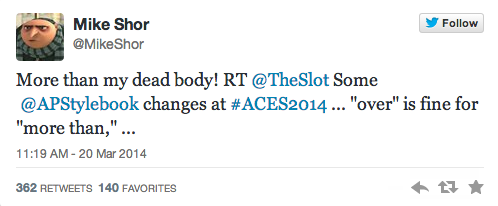1. Toward vs. Towards
AP Stylebook says: “Toward” Not towards.
Jordan says: I’m going to start this a little harsh. As much as some people love the word “towards,” it is sadly not a word, at least not in the English language. Making copy editors cry is not your goal here.
2. Who vs. Whom
AP Stylebook says: Who is the pronoun used for references to human being and to animals with a name. It is grammatically the subject of a sentence, clause or phrase (ie: The woman who rented the room left the window open).
Whom is used when someone is the object of a verb or preposition (ie: The woman to whom the room was rented left the window open).
Jordan says: I’ll admit. This one still gets me sometimes. But it is doable. When in doubt, pull the guide out!
3. Farther vs. Further
AP Stylebook says: Farther refers to physical distance.
Further refers to an extension of time or degree.
Jordan says: Now this one seems pretty self-explanatory, but somehow I always stumble upon a sentence such as, “We should think farther into the situation.” And I’m further convinced that no one proofreads.
4. Oxford Comma
AP Stylebook says: In a series: Use commas to separate elements in a series, but do not put a comma before the conjunction in a simple series (ie: The flag is red, white and blue.)
Jordan says: Many people do not understand this rule and for good reason. Until I got to college, I was always taught as a writer (but not a journalist) to use oxford commas. Journalists frown at the idea now.
5. Numbers
AP Stylebook says: Spell out whole numbers up to (and including) nine (ie: zero, one, nine, 109, 52, etc.)
Jordan says: Aren’t numbers fun? You chose to be a writer, but math never really goes away.
6. When you don’t know what a semicolon is (;)
AP Stylebook says: In general, use the semicolon to indicate a greater separation of thought and information than a comma can convey but less than the separation that a period implies.
Jordan says: Basically, at all costs, just avoid the semicolon. It’s evil.
7. Exclamation marks
AP Stylebook says: Avoid overuse: Use a comma after mild interjections. End mildly exclamatory sentences with a period.
Jordan says: Basically what they are saying is no. Just don’t. I beg you.
8. Lay/Lie
AP Stylebook says: The action word is lay. It takes a direct object. Laid is the form for past tense. Its present tense is laying.
Lie indicates a state of reclining along a horizontal plane. It does not take a direct object. Its past tense is lay. Its past participle is lain. Its present participle is lying.
Jordan says: Snoopy is lying on top of his house.
9. Effect/Affect
AP Stylebook says: Affect, as a verb, means to influence (ie: The game will affect the standings). Affect, as a noun, is best avoided. Effect, as a verb, means to cause (ie: He will effect many changes in the company). Effect, as a noun, means result (ie: The effect was overwhelming).
Jordan says: This one is on here just for me. It took me four years of college to finally tell the difference between the two. I also found out I have used them wrong my entire life.
10. Subject and Verb Agreement
AP Stylebook says: This is one that is not printed in the AP Stylebook, but the Purdue Owl helps us out here. When the subject of a sentence is composed of two or more nouns or pronouns connected by and, use a plural verb. When two or more singular nouns or pronouns are connected by or or nor, use a singular verb.
Jordan says: This seems complicated, but it really isn’t. Nothing is worse than reading “One of the boys are going to school today.”
11. Their/There/They’re
AP Stylebook says: Their, there, they’re “Their” is as possessive pronoun: They went to their house. “There” is an adverb indicating direction: We went there for dinner. “There” also is used with the force of a pronoun for impersonal constructions in which the real subject follows the verb: There is no food on the table. “They’re” is a contraction for they are.
Jordan says:
12. More than vs. Over
AP Stylebook says: “Over”, as well as “more than”, is acceptable to indicate greater numerical value.
Jordan says: You know every year, when a new version of the AP Stylebook comes out and you vow that your 2010 version is just as good as that one? They don’t really change much do they? WRONG. This year, the AP decided that the rule of “more than” and “over” was no longer relevant. The rule used to be that “over” was only usable when talking about actual space (ie: The cow jumped over the moon) and it was always “more than” when referring to numbers (ie: He earned more than $50,000 this year). However, things change and things you thought you knew…are wrong. Both terms are now acceptable to use for either reference. *Cue sobbing of copy editor*














Christine Zhao • Aug 28, 2014 at 6:44 pm
This is a good piece! (it made me laugh)
pixplz • Apr 10, 2014 at 5:36 pm
Muni not MUNI (it isn’t an acronym)
among not amongst
amid not amidst
while not whilst
Claire Bullows • Apr 21, 2014 at 9:41 pm
Depends where you live.